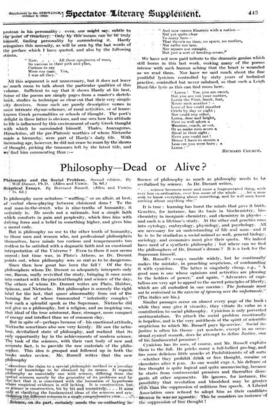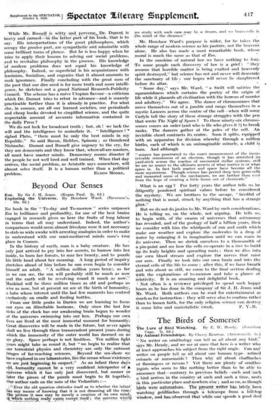Philosophy—Dead or Alive ?
Is philosophy mere nebulous " waffling," or an affair, at best, of 'verbal chess-playing: between cloistered dons ? To the real man-in-the-street; who is nine-tenths of humanity, it certainly is. He needs not a rationale, but a simple faith which comforts in pain and perplexity, which fires him with driting force and a belief in something higher, and gives him a moral code.
But is philosophy no use to the other tenth Of huManity, to those men and women who, not professional philosophers themselves, have minds too curious and -temperaments too restless to be satisfied with a dogmatic faith and an emotional interpretation of the Universe ? Even to them it now seems unreal ; but time was, in Plato's Athens, as Dr. Durant points out, when philosophy was so real as to be dangerous.
Since then how great has been the fall ? Of the five philosophers whom Dr. Durant so adequately interprets only one, Bacon, really revivified the study, bringing it once more into contact with the practical thought and science of the day.
The others of whom Dr. Durant writes are Plato, Hobbes, Spinoza, and Nietzsche. But philosopher is scarcely the.right label for the last, that queer abnormality from out of the burning fire of whose transmuted " inferiority complex " Ile* such a splendid spark as the Superman. Nietzsche did not giVe us a philosophy,'but a religion, and an inspiring one, that ideal of the true aristocrat, finer, stronger, more compact
Of energy and intellect than we of common clay. - - But in spite of—perhaps because of—his emotional attitude, 14ietzsche sometimes also saw very keenly: He saw the nebu- louf,_ devitalized state of philosophy, and realized that its only opportunity lay in the achievements of modern science. The task of the sciences, with their vast body of new and
accurate fact, is to provide the raw- Materials of the philo- sopher. This idea is grasped and followed up in both the ;Zits under review. Mr.- Russell writes that the new osophy • " ahandons the claim to a special philo-sephie method or a'peculiar brapd of knowledge to be Obtained by its means. It regards philbsophy as essentially one with science, differing from the sPetial sciences merely by the generality • of its problems and by the' fact that it- is concerned with the formation of hypotheses whOre empirical evidence is still lacking. It is constructive, but , as ` ienee is constructive, bit by bit and tentatively. . . . It aims ohl at clarifying the fundamental ideas of the sciences and syn- th g the different 'sciences in p single comprAbensive view. .
Science; on its part, certainly needs -the eo-ordinatinrin- fluence of philosophy as much as philosophy needs to be revitalized by science. As Dr. Durant writes,
lt
• • • science becomes more and more a fragmentated thing, with ever-less co-ordination, ever less sense of the whole . . . let a man seek to know everything shout something, and he will soon know nothing about anything else."
It is true : learning has burst the minds that gave it birth. Genetics, for instance, has its basis in biocheMistry, bio- chemistry in inorganic chemistry, and chemistry- in physics— and each is a lifetime's study. At the other end genetics runs into cytology, embryology,, physiology, and psychology. All are necessary for an understanding of life and man—and if he is to be studied as a social animal as well, general biology, sociology, and economics must give their quota. We indeed have need of a synthetic philosophy ; but where can we find the philosophers.of Dr. Durant's dreani?' It is a task for the
Superman himself.
Mr. Russell's essays ramble widely, but he continually'
makes the mistake, in preaching scepticism, of confounding it with cynicism. The latter is singularly cheap, e.g., 4-A good man is one whose opinions and activities are pleasing to the holders of power," and again, " Advocates of capi- talism are very apt to appeal to the sacred principles of liberty, which are all embodied in one maxim •: The fortunate niust. not be restrained in the:eiercise of tyranny_over the unfortunate."
(The italici are.his.) _ Similar._ passages occur on almost every page of the book while they may give it vivacity, they vitiate its_ value as a contribution to social philosophy. Cynicism is only perverted sentimentalism. To attack the social problem emotionally is hopeless; and is the very antithesis of the spirit of scientific scepticism to which Mr. Russell pays lip-service: Social in- justice is often his themeyet nowhere, except in an occa- sional .cynical remark, does he attempt to define Justice, one of liifundamental premises ! Cynicism has its uses, of course, and Mr. Russell exploits them to the full. He pricks many a full-bellied gas-bag,.and
has some delicious little smacks at Prohibitionists of all sorts —whether they prohibit .drink or free thought, cocaine or chocolates after 8 p.m. As onewould expert, his defence of free thought is quite logical and quite unconvincing, because he starts from controversial premises and thereafter diSre- gards all other arguments. He . ignores, for instance, the possibility that revolution and bloodshed may be greater evils than the suppression of seditious free speech. A Liberal. Association once refused to adopt him as their candidate. bk.-mist he •was'an agnostic:` • This lie considers an instance- of the suppression of free thought 1 While Mr. Russell is witty and perverse pr. Durant, is heavy and earnest—in the fatter-part-Of his book, that is to say. His interpretations of the great philosophers, which occupy the greater part, are sympathetic and admirable with some brilliant turns of phrase. But he is less happy when he tries to apply their lessons to solving, our 'social problems, and to revitalize philosophy in the process. His knowledge of modern problems does not equal his knowledge of philosophy. Indeed, so superficial is his acquaintance with feminism, Socialism; and eugenics that it almost amounts to rank ignorance. Finally concluding with the great men of the past that our dire need is for more truth and more intelli- gence, he sketches out a grand National Research-Publicity Council. The scheme has a naive Utopian flavour—a criticism which Dr. Durant tries to rebut in advance—and is scarcely 'practicable further than it is already in practice. For what else, in essence, are all our learned soCieties; our periodicais and cheap books devoted to simplified science, and the quite respectable amount of accurate information contained in the daily Press ?
We do not lack for broadcast truth ; but, oh ! we lack the will and the intelligence to assimilate it. " Intelligence I " Sighed Plato, " there must be Only the best thin& in MY Republic." So said Bacon; Hobbes, Spinoia ; so thundered Nietzsche. DUrant and Russell give Urgency to the cry, for they are democrats and they know that, where all are masters, 'all Inuit, have master minds. Demberacy means disaster if the people be not well bred and well trained. When that day arrives, the social problem, as Aristotle says somewhere, will almost solve itself. It is a human rather than a political























































 Previous page
Previous page